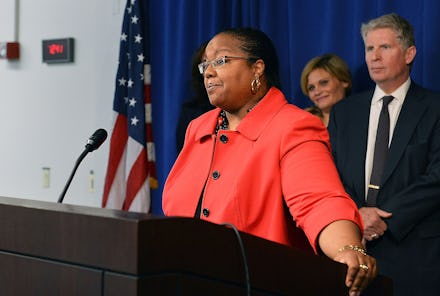How These Detroit Women Took on a Rape Kit Testing Backlog

When Kym L. Worthy, head of the prosecutor's office in Wayne County, Michigan, discovered more than 11,000 untested rape kits, some decades old, in a Detroit Police Department storage facility in 2009, she was determined to test them all. Fixing this, however, included a hefty cost: More than $27 million for testing each kit and hiring prosecutors to carry out affiliated cases. Yet it looks like the crusader will succeed, thanks not only to years of her own perseverance but the crucial help of myriad powerful women in the community.
The crusaders: After realizing there were "no resources, no money and no support from the county of Wayne," at her disposal, Worthy "asked everybody for money," she recently told the New York Times. As of 2014, however, Worthy's tireless fundraising covered the costs for only 2,000 kits to be tested, according to USA Today.
But her efforts began to attract the attention of powerful members in the Detroit business community — particularly female entrepreneurs. Detroit businesswoman Joanna Cline, for example, told the New York Times she "was and am furious" about the backlog and began emailing colleagues, rallying them to action. Cline, as well as other powerful women in the community, joined efforts in the form of an organization: Enough SAID (Sexual Assault in Detroit).
A collaboration between the Michigan Women's Foundation, the Wayne County Prosecutor's Office and the Detroit Crime Commission, Enough SAID seeks private funds to test "forgotten rape kits, investigate the crimes and prosecute the resulting cases, thus securing justice and closure for victims, and ensuring a safer community for everyone," according to its website. The organization has in turn garnered the support of a female-run marketing agency and encouraged a group of African-American businesswomen to raise $657,090 by the end of 2016 for the effort, the New York Times reported.
The backlog. While the efforts of powerful women in this community addressing this is inspiring, the problem of rape kit backlogs extends well beyond Detroit. There are many reasons the backlog exists, according to the organization End The Backlog. Each kit costs between $1,000 and $1,500 to test, for example, and crime labs and police departments frequently lack the resources required to process them. What's more, the wider disbelief and discrediting of survivors that exists in society at large is certainly evident even within systems supposedly constructed to help survivors of crimes seek justice.
Although DNA evidence collected in rape kits can be crucial to allowing sexual assault survivors to seek legal justice by helping to identify suspects, these factors contribute to the reality that as many as 400,000 kits remain untested in the United States.
It's about broader justice. Testing kits not only has the potential to hold individual assailants accountable but can potentially even prevent assaults. Studies show that many rapists are repeat offenders; facing punitive measures for one assault based on evidence gleaned from a rape kit could make future ones impossible to commit. For example, Houston officials realized this could have been the case in their community after they completed analyzing DNA evidence in 850 of 6,600 sexual assault cases by February, many of which date back to the mid-1980s. Six of the 29 charges filed based on those results were repeat offenders that could have been caught earlier had the kits been tested, and DNA cross-referenced with other databases, in a timely manner.
The women involved in Detroit's Enough SAID further recognize the broader implications of testing rape kits on their community at large. In fact, 81% of the untested kits belonged to black women. The effort is one that aims to address Detroit's overall well-being. As one lawyer involved with Enough SAID, Michelle Busuito, told the New York Times, "you can't have economic development if you can't feel safe walking to your car after work."
While some have validly questioned whether raising private funds is a viable, long-term solution, it's clear there is at least immediate value in powerful women (literally) paying it forward, using their own good fortune to help other women seek their own.
h/t New York Times